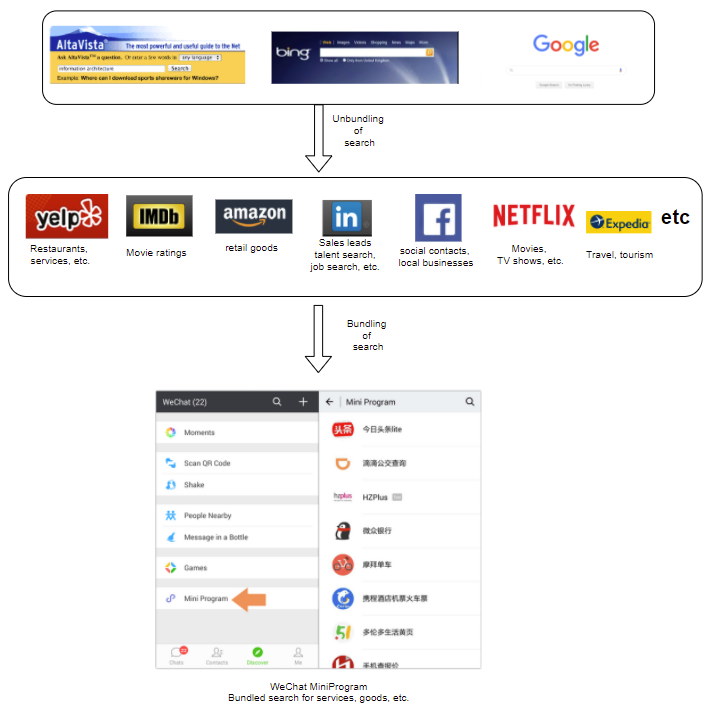The Evolution of Internet Search →
Over the last couple of decades, internet search has evolved a lot. This evolution has several facets - on one hand technology changes like Web 2.0, semantic web, richer media, etc., and on the other hand going from generic to specific - or unbundling and bundling of search.
In the early days of search engines, one would search every generic thing on the search engine application. If we want to see if there are good Pizzerias near our hotel during a trip to Paris, we would look for pizzerias in Paris and whichever fancy restaurant had made an effort to create a website (a static one) might show up. As technologies evolved and when we were able to interact more with the webpages (Javascript, PHP, CSS), one could also click on a dropdown menu and check out the price list of the pizzeria which might change seasonally, and of course several advertisement banners the show information about the baseball game happening nearby. One was also able to give feedback on the website for other visitors to see.
Fast forward to today, with the evolution of the so called So-Lo-Mo (for Social, Location, Mobile), we could search for pizzerias in a 5 km radius around 75014. And we do not even do it on Bing or Google, rather on a specific application like Yelp. Besides the list of pizzerias around 75014 (location), the app would also show us what different people liked in the pizzeria and their opinion (social). Further we do not need to search for a cyber-cafe or a dial-up network in the hotel room. We can use this application from a cellular phone (mobile) which has a GPS that allows us to pin-point our location on a map in case we get lost looking for the pizzeria.
From searching on one single generic search page, we have moved on to specific apps that provide specific search information. If we want to know how good is a movie, rather than asking Google, we go and check the rating for the movie in IMDB. If we want to watch an awesome movie starring Margot Robbie, you search in Netflix for movies Margot Robbie stars in and pick one. If you want to look for your school friend whom you lost touch with, you search for him in Facebook.

While the unbundled search started becoming more and more popular in the western world, in Asia the popular WeChat app started bundling it. More than calling it bundling, it severed as a gateway to searching many specialized goods and services from within the main search app. Many of these services (called MiniProgram) can be accessed only from within the WeChat app. One could think of WeChat as a mobile operating system within an app. All you want from a mobile operating system is a bunch of useful apps that serve your needs (unlike desktop operating system that has somewhat different set of characteristics) and WeChat provides exactly that. Lately, Facebook is trying to bundle more services (search, shopping, payment, etc.) into one.
What makes a great search experience? Everything bundled in one - which makes it simple to search or is it better to have specialized, standalone search applications - less clutter, more refined for what we are looking for? Many top product companies are confused about this very question. The answer is not going to be simple. No one method will ever become the dominant option and so many companies need to evaluate the markets where they want to grow or maintain dominance in order to make this decision. In a future post, we will debate the impact of the different choices on search advertising.